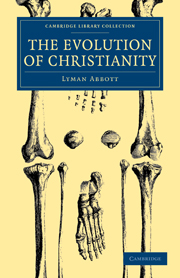Book contents
- Frontmatter
- Preface
- Contents
- CHAPTER I EVOLUTION AND RELIGION
- CHAPTER II THE EVOLUTION OF THE BIBLE
- CHAPTER III THE EVOLUTION OF THEOLOGY: THE OLD THEOLOGY
- CHAPTER IV THE EVOLUTION OF THEOLOGY: THE NEW THEOLOGY
- CHAPTER V THE EVOLUTION OF THE CHURCH
- CHAPTER VI THE EVOLUTION OF CHRISTIAN SOCIETY
- CHAPTER VII THE EVOLUTION OF THE SOUL
- CHAPTER VIII THE SECRET OF SPIRITUAL EVOLUTION
- CHAPTER IX CONCLUSION: THE CONSUMMATION OF SPIRITUAL EVOLUTION
CHAPTER IX - CONCLUSION: THE CONSUMMATION OF SPIRITUAL EVOLUTION
Published online by Cambridge University Press: 29 August 2010
- Frontmatter
- Preface
- Contents
- CHAPTER I EVOLUTION AND RELIGION
- CHAPTER II THE EVOLUTION OF THE BIBLE
- CHAPTER III THE EVOLUTION OF THEOLOGY: THE OLD THEOLOGY
- CHAPTER IV THE EVOLUTION OF THEOLOGY: THE NEW THEOLOGY
- CHAPTER V THE EVOLUTION OF THE CHURCH
- CHAPTER VI THE EVOLUTION OF CHRISTIAN SOCIETY
- CHAPTER VII THE EVOLUTION OF THE SOUL
- CHAPTER VIII THE SECRET OF SPIRITUAL EVOLUTION
- CHAPTER IX CONCLUSION: THE CONSUMMATION OF SPIRITUAL EVOLUTION
Summary
In this chapter I propose rapidly to survey the ground already traversed, re-state the conclusions reached, and finally re-define, in the language of evolutionary theology, some theological terms in common use.
God is in his world. Nature is not a machine which a mechanic has made, wound up, and set going, and with which he must from time to time interfere, as a watchmaker interferes to regulate a somewhat imperfect time-keeper. Nature is the expression of God's thought, the outward utterance of himself. He dwells in it and works through it. Amid all the mysteries by which we are surrounded, says Herbert Spencer, nothing is more certain than this, that we are ever in the presence of an Infinite and Eternal Energy from which all things proceed. This Infinite and Eternal Energy from which all things proceed is an intelligent Energy. It is an Energy that thinks, and creation is the expression of the thought of this Infinite and Eternal Energy. Much of the old teleological argument, as it is called, may perhaps be set aside by modern research, and I believe that the notion of secondary causes proceeding from a great First Cause must be set aside. But in the world there is one underlying Cause which is the source and fountain of all power; and the fact that we investigate natural phenomena, and endeavor to see their relations to one another, shows that there are relations in those phenomena which the intellect can comprehend, and which therefore are themselves intellectual.
- Type
- Chapter
- Information
- The Evolution of Christianity , pp. 245 - 258Publisher: Cambridge University PressPrint publication year: 2009First published in: 1892



